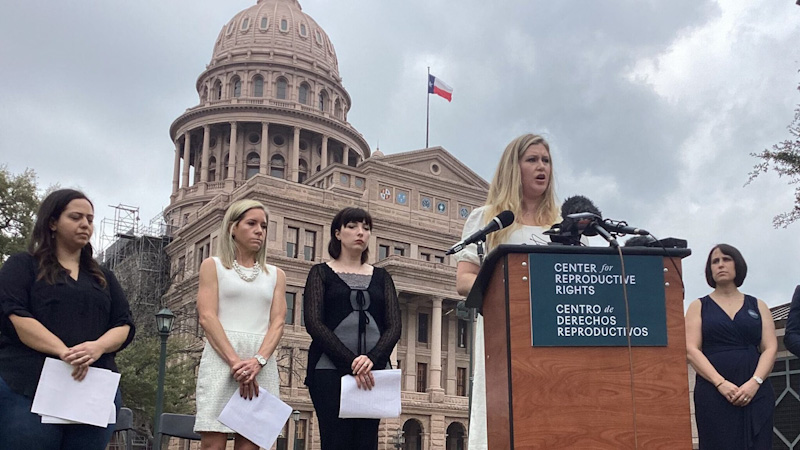Suit filed on behalf of women denied abortions in Texas despite dangerous health complications

At a press conference March 7 in Austin, Texas, Lauren Miller (at the podium) and other plaintiffs in a Texas lawsuit speak about their experiences facing dangerous pregnancy complications and being denied abortion care. Photo from the Center for Reproductive Rights' March 7 press release.
Doctors and hospitals in Texas are turning away pregnant women who face serious health risks and need abortions because the medical providers fear prosecution, according to a lawsuit filed Monday.
The plaintiffs are two obstetrician-gynecologists in Texas and five women who were denied abortions despite dangerous pregnancy complications, according to a March 7 press release by the Center for Reproductive Rights. The group is representing the plaintiffs, along with co-counsel from Morrison & Foerster and the Kaplan Law Firm.
The March 6 suit, filed in state court in Austin, Texas, seeks a declaratory judgment clarifying the scope of Texas’ exception to its abortion bans.
The court should determine that physicians using their good-faith judgment may provide abortions to women with an emergent medical condition “that poses a risk of death or a risk to their health (including their fertility),” the suit says.
At a minimum, the suit says, the court should determine that physicians may provide abortions when a medical condition makes the continued pregnancy unsafe, when a medical condition is made worse by pregnancy and can’t be effectively treated, or when the fetus is unlikely to survive the pregnancy.
Texas has three abortion bans, according to the press release.
• A state trigger ban, according to Houston Public Media, that took effect after the U.S. Supreme Court overturned in 2022 the abortion-rights opinions Roe v. Wade and Planned Parenthood v. Casey bans all abortions—with limited exceptions.
• A second law authorizes private suits for damages against those who aid an abortion after about six weeks of pregnancy.
• A third abortion ban was enacted before Roe was originally decided in 1973; several courts have ruled that the law was impliedly repealed.
Physicians in Texas who violate the state’s abortion laws face fines of at least $100,000, up to 99 years in prison and revocation of their medical licenses. The state makes an exception when a physical condition arising from pregnancy places the woman “at risk of death or poses a serious risk of substantial impairment of a major bodily function,” the New York Times reports, citing guidance by Republican Texas Attorney General Ken Paxton.
The lead plaintiff in the new suit is Amanda Zurawski of Austin, Texas, who said she was denied an abortion after she experienced a condition known as PPROM, which is also known as preterm premature rupture of membranes. Three days later, Zurawski experienced sepsis and underwent an emergency induction abortion. The infection caused one of Zurawski’s fallopian tubes to permanently close. She is now seeking to become pregnant through in vitro fertilization.
“Texas officials claim the bans they passed protect ‘life,’ but there’s nothing pro-life about them. I nearly died as a direct result of the anti-abortion restrictions in Texas,” Zurawski said in the press release.
Another plaintiff, Ashley Brandt of Dallas had to travel to Colorado to obtain a fetal reduction abortion after learning that the skull of one of her twins was not developing normally. Afterward, her Texas physician was so fearful that he described her condition as “vanishing twin syndrome,” the suit says.
“The Supreme Court may have stripped pregnant people of their federal constitutional right to abortion,” the suit says, “but that does not mean that plaintiffs are without constitutional rights.”
The suit cites provisions of the Texas Constitution that guarantee equal rights and that preserve privileges and immunities.
Besides the New York Times, publications covering the suit include the Associated Press and Reuters.
Write a letter to the editor, share a story tip or update, or report an error.



